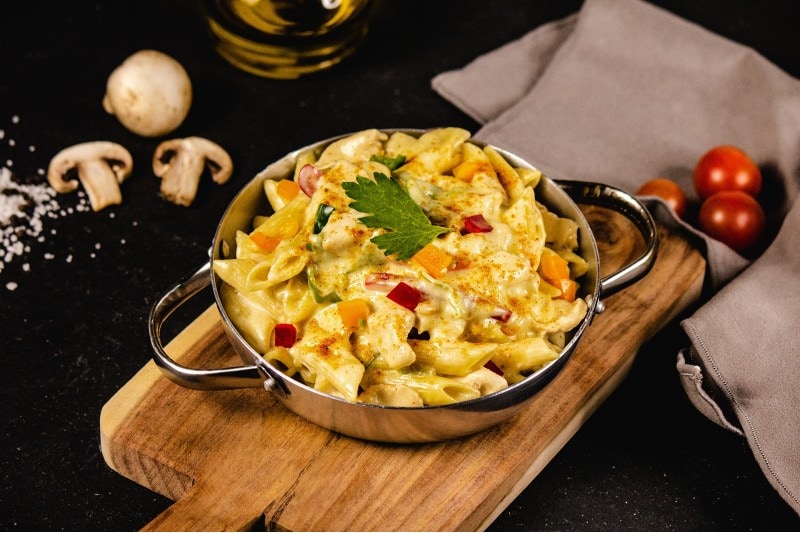With its butter, cheese, and sometimes heavy cream, alfredo is a popular sauce for pasta. You might want to feed your dog your rich pasta dish, but the dairy in it can be bad for their health. Also, garlic and onions, which are commonly used in Alfredo, may be harmful to your health and cause serious problems.
Can dogs eat Alfredo sauce? How healthy is it? No, dogs shouldn’t eat Alfredo sauce. It’s not only unhealthy, but it can cause poisoning with severe consequences.
Can Dogs Eat Shrimp Alfredo? A Vet’s Guide to Safe Treats
As dog owners, we love to pamper our pups with special treats. Shrimp alfredo, with its savory garlic-cheese flavor, seems like it would be an irresistible snack. However, vets caution against feeding creamy, seasoned dishes to dogs. While the shrimp itself provides protein, alfredo sauce can wreak havoc on a dog’s digestive system and overall health.
Understanding canine nutritional needs is key to providing safe, enjoyable treats for your furry friend. With some tips from veterinary experts, you can keep your dog happy while avoiding harmful foods like shrimp alfredo.
An Overview of Canine Dietary Requirements
Dogs have specific nutritional requirements to maintain good health, These include
- Protein for muscle growth and tissue repair
- Fat for skin/coat health and vitamin absorption
- Carbs for energy
- Vitamins like A, B, C, D, E, and K
- Minerals like calcium, phosphorus, magnesium, iron, and zinc
While the occasional nibble of human food is fine, their main diet should consist of complete, balanced commercial dog food. Supplementing with fruits, veggies, and lean proteins is okay in moderation.
It’s important to understand how different human foods fit into these nutritional needs. While shrimp provides protein, alfredo sauce adds unnecessary fat, spices, and dairy that can be unhealthy. Always check with your vet before introducing new foods.
The Benefits and Risks of Shrimp for Dogs
Shrimp can be a tasty source of protein and antioxidants for dogs. The benefits include:
- High-quality protein for strong muscles
- Antioxidants like astaxanthin for immunity
- Vitamin B12, iron, zinc, copper, and magnesium
However, there are some risks with shrimp:
- Potential shellfish allergy: look for itching, swelling, vomiting
- Choking hazard from shells or tails
- High cholesterol if fed in excess
To enjoy shrimp safely, opt for a few peeled, plain-cooked pieces served occasionally as a treat. Avoid seasonings.
Why Vets Warn Against Alfredo Sauce
While shrimp can provide healthy nutrients in moderation, alfredo sauce is best avoided. Here’s why vets recommend against this topping:
- High fat content can cause pancreatitis
- Heavy cream and cheese are difficult for dogs to digest
- Garlic and onions are toxic for dogs and can damage red blood cells
- Seasonings like salt, pepper, or spices can also irritate dogs’ stomachs
The bottom line is that the high-fat, seasoned creamy sauce poses substantial health risks for dogs without any nutritional payoff. It’s better to skip it altogether when treating your pup.
Healthier Treat Alternatives Vets Recommend
When preparing seafood snacks, simplicity is key. Go for plain, cooked boneless options like:
- Salmon: Rich in omega-3s for skin/coat health
- Tuna: Provides protein, omega-3s, niacin, selenium
- Sardines: Calcium-rich for strong bones and teeth
Beyond seafood, some other healthy, dog-safe options include:
- Carrots: Packed with vitamin A for good vision
- Apples: Provide vitamin C, fiber for digestion
- Peanut butter: A superfood in moderation; pick natural/xylitol-free
- Sweet potatoes: Full of vitamin B6, manganese, beta-carotene
Check with your vet before introducing any new foods to ensure safety and balance.
Signs Your Dog May Be Sick from Shrimp Alfredo
Keep a close eye on your dog after treating them to any new food. Symptoms that may indicate an allergic reaction or illness include:
- Vomiting/diarrhea: digestive upset
- Gas/bloating: trouble breaking down foods
- Lethargy: lack of energy from sick stomach
- Itchy skin, ears, paws: allergic reaction
- Swollen face/throat: anaphylaxis
Seek veterinary care immediately if you notice any concerning reactions. It’s always better to be safe when it comes to your dog’s health.
Your Vet Is Your #1 Resource for Safe, Nutritious Foods
As a pet parent, you always want the best for your furry companion. Lean on your veterinarian to determine which human foods are truly safe and nutritional versus harmful. They can offer personalized advice based on your dog’s health history and needs.
While shrimp alfredo may seem like an amazing treat, it poses substantial risks without any real benefits. Stick to plain proteins, fruits, and veggies recommended by your vet for tail-wagging good times. With a balanced diet of dog food and safe snacks, your pup will have the energy and nutrition they need to thrive.

What’s in Alfredo Sauce?
Traditional alfredo sauce is a rich white pasta sauce made with parmesan cheese, garlic, butter, and parsley. Non-traditional alfredo sauce may have additional ingredients, such as heavy cream, vegan dairy, or different herbs and spices.

Can Dogs Eat Alfredo Sauce?
Alfredo sauce isn’t safe for your dog for many reasons. The fact that it contains garlic and/or onions is the main concern. Alfredo sauce usually contains garlic, whether in fresh or powder form. Garlic, onions, and other members of the Allium genus are toxic to dogs. They have dangerous chemicals in them, like N-propyl disulfide, that can hurt a dog’s red blood cells and cause severe anemia.
Garlic is the most potent of all Alliums, being approximately five times more potent than onions. Moreover, powdered garlic is the most dangerous form since it is more concentrated. Signs of anemia due to garlic poisoning may include weakness, lethargy, abdominal pain and pale or yellow mucous membranes. Though rarely fatal, dogs will need supportive care to overcome garlic toxicity.
The dairy base of the sauce is not toxic but still a cause of concern, as fatty foods can, on occasion, trigger pancreatitis in dogs. Pancreatitis involves inflammation of the pancreas and causes poor appetite, nausea, vomiting, abdominal pain, diarrhea, and lethargy.
Supportive care is given for pancreatitis, which includes hospitalization, fluid therapy, special nutrition, and medicines to treat your dog’s symptoms and keep them from getting worse.

Can Dogs Eat Shrimp? All You Need to Know!
Can dogs eat fried shrimp?
When served raw and uncooked, shrimp contains harmful bacteria that may have a negative impact on your dog’s digestive system. For this reason, we’d recommend that you only feed your dog shrimp that’s been cooked. Deep-fried shrimp is something we don’t recommend that you feed your pup.
Can one eat raw shrimps?
While raw shrimp or shrimp sashimi can be consumed safely, raw shrimp is considered a high-risk food because it can harbour harmful bacteria such as Salmonella and various Vibrio bacteria. Although some people consider the seafood used in ceviche raw, it is actually cooked by immersing it in an acid rather than using heat. The acid from the citrus can reduce harmful bacteria but it is not as effective as using heat. The safest approach would be to consume only cooked shrimp from a reliable source. The US Food and Drug Administration(FDA) advises that pregnant women, those with weakened immunity, older adults, and young children are at higher risk of foodborne illness and its consequences and should avoid all raw seafood.
Can dogs eat wild shrimp?
Fresh, wild shrimp is the best choice to share with your dog. Farm-raised shrimp pose a bit of a problem because farmers use disinfectants, antibiotics, and pesticides. Those chemicals serve the purpose of preventing shrimp disease, but they can be very harmful. It’s important to know where your shrimp comes from!
Can dogs eat shrimp scampi?
This is one of the types of shrimp dogs can usually consume without much trouble, although the garlic can be a little rich for their stomachs. We’d recommend moderation here so you don’t give your pup stomach problems. Usually, people aren’t making scampi to feed directly to their dog, and it’s a result of leftovers.
